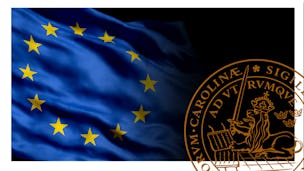About this Course
This six-week course titled Competing in Europe is the third in a series of three exploring some of the main business aspects of European Union law. Besides providing learners with a sound knowledge base of European laws and regulations, the series explores business considerations within a broader perspective by including inputs from leading law practitioners in the field. More specifically, the third course discusses how to compete on the internal market and protect your brand, product or invention. It includes legal disciplines such as Intellectual Property law (IP law), Competition law and specific branches within Public law, such as public procurement and state aid. At the end of this course, you will have a basic understanding of how to: • Find and understand relevant laws and regulations governing the internal European Union market • Protect and defend a company’s products, brands and inventions by obtaining and licensing trademarks and patents • Create a competitive edge for a company and apply the basic principles of EU competition law • Construct and present a persuasive legal argument About the Series The Lund series in European Business Law ranges from considering the basic structures and principles of the European Union to focusing on specialized areas of European Union law. The first course, Understanding the Fundamentals, examines the core structures and principles of the European Union. The second course, Doing Business in Europe, examines legal areas such as Company law, Labour law, Tax law, Environmental law and Private International law, and how they tie in to doing business in Europe. All three courses can be taken independently or in sequence depending on your needs and preferences. To keep up to speed on the course series, visit our Facebook page at: https://www.facebook.com/eblmooc/ Syllabus and Format Each course consists of a number of modules where one module represents about one week of work. A module includes a number of lectures and readings, and finishes with an assessment – a quiz or a peer graded assignment. The assessments are intended to encourage learning and ensure that you understand the material of the course. Participating in forum discussions is voluntary. Course I - Understanding the Fundamentals Module 1. Introduction Module 2. Legal Method and Sources Module 3. Constitutional Freedoms and Fundamental principles Module 4. Enforcement of EU Law and Judicial Review Module 5. Freedom of Movement Module 6. The External Dimension Course II - Doing Business in Europe Module 1. Making Business Transactions Module 2. Establishing a Company Module 3. Employing and Working in Europe Module 4. Paying Taxes and Complying with Environmental Standards Module 5. Resolving Cross-border Disputes Module 6. Case Clinic Course III - Competing in Europe Module 1. Obtaining Trademarks Module 2. Defending Patents Module 3. Competition: Illegal Agreements Module 4. Competition: Abuse of Dominance and Mergers Module 5. Selling to the State and State Aid Module 6. Advocacy and Legal Writing Lund University Lund University was founded in 1666 and has for a number of years been ranked among the world’s top 100 universities. The University has 47 700 students and 7 500 staff based in Lund, Sweden. Lund University unites tradition with a modern, dynamic, and highly international profile. With eight different faculties and numerous research centers and specialized institutes, Lund is the strongest research university in Sweden and one of Scandinavia's largest institutions for education and research. The university annually attracts a large number of international students and offers a wide range of courses and programmes taught in English. The Faculty of Law is one of Lund University’s four original faculties, dating back to 1666. It is a modern faculty with an international profile, welcoming both international and Swedish students. Education, research and interaction with the surrounding community are the main focus of the Faculty’s work. The connection between the three is particularly apparent in the programmes and courses offered by the university, including the university’s MOOC course in European Business Law. The students get the chance to engross themselves in traditional legal studies, while interacting with both researchers and professionally active lawyers with qualifications and experience from various areas of law. The faculty offers three international Masters: two 2-year Master’s programmes in International Human Rights Law and European Business Law, and a 1-year Master’s in European and International Tax Law. Students from around 40 countries take part in the programmes which offer a unique subject specialization within each field, with highly qualified researchers and professional legal practitioners engaged in the teaching. The Master’s programme in European Business Law provides an in-depth understanding of both the practical and the theoretical aspects of business law within the European Union. The programme provides both general and specific knowledge of the European Union legal framework, which is necessary for students intending to work as legal advisors or business decision-makers. The programme is delivered in English and is open to students with at least a three year degree in Law (Bachelor, LL.B, or equivalent) who want to specialise in European economic and business law. The MOOC course in European Business Law is a great course to start with for students intending to apply for the Master’s programme in European Business Law. Even though the MOOC course does not grant credits previous knowledge of the subject is considered upon admission to the master’s programme. For more information about the Master’s programme in European Business Law see https://www.law.lu.se/#!meb





















